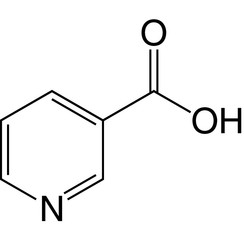You have no items in your shopping cart
Nicotinic acid
Niacin, also known as nicotinic acid, is an organic compound and a form of vitamin B3, an essential human nutrient. Niacin is obtained in the diet from a variety of whole and processed foods, with highest contents in fortified packaged foods, meat, poultry, red fish such as tuna and salmon, lesser amounts in nuts, legumes and seeds. Niacin as a dietary supplement is used to treat pellagra, a disease caused by niacin deficiency. Signs and symptoms include skin and mouth lesions, anemia, headaches, and tiredness. Many countries require its addition to wheat flour or other food grains, thereby reducing the risk of pellagra.
Although niacin and nicotinamide (niacinamide) are identical in their vitamin activity, nicotinamide does not have the same pharmacological, lipid-modifying effects or side effects as niacin, i.e., when niacin takes on the -amide group, it does not reduce cholesterol nor cause flushing. Nicotinamide is recommended as a treatment for niacin deficiency because it can be administered in remedial amounts without causing the flushing adverse effect.
Niacin is also a prescription medication. Amounts far in excess of the recommended dietary intake for vitamin functions will lower blood triglycerides and low density lipoprotein cholesterol (LDL-C), and raise blood high density lipoprotein cholesterol (HDL-C, often referred to as "good" cholesterol). There are two forms: immediate-release and sustained-release niacin. Initial prescription amounts are 500 mg/day, increased over time until a therapeutic effect is achieved. Immediate-release doses can be as high as 3,000 mg/day; sustained-release as high as 2,000 mg/day. Despite the proven lipid changes, niacin has not been found useful for decreasing the risk of cardiovascular disease in those already on a statin. A 2010 review had concluded effectiveness of niacin as a mono-therapy, but a 2017 review incorporating twice as many trials concluded that prescription niacin, while affecting lipid levels, did not reduce all-cause mortality, cardiovascular mortality, myocardial infarctions, nor fatal or non-fatal strokes. Prescription niacin was shown to cause hepatotoxicity and increase risk of type 2 diabetes. Niacin prescriptions in the U.S. had peaked in 2009, at 9.4 million, declining to 1.3 million by 2017.

